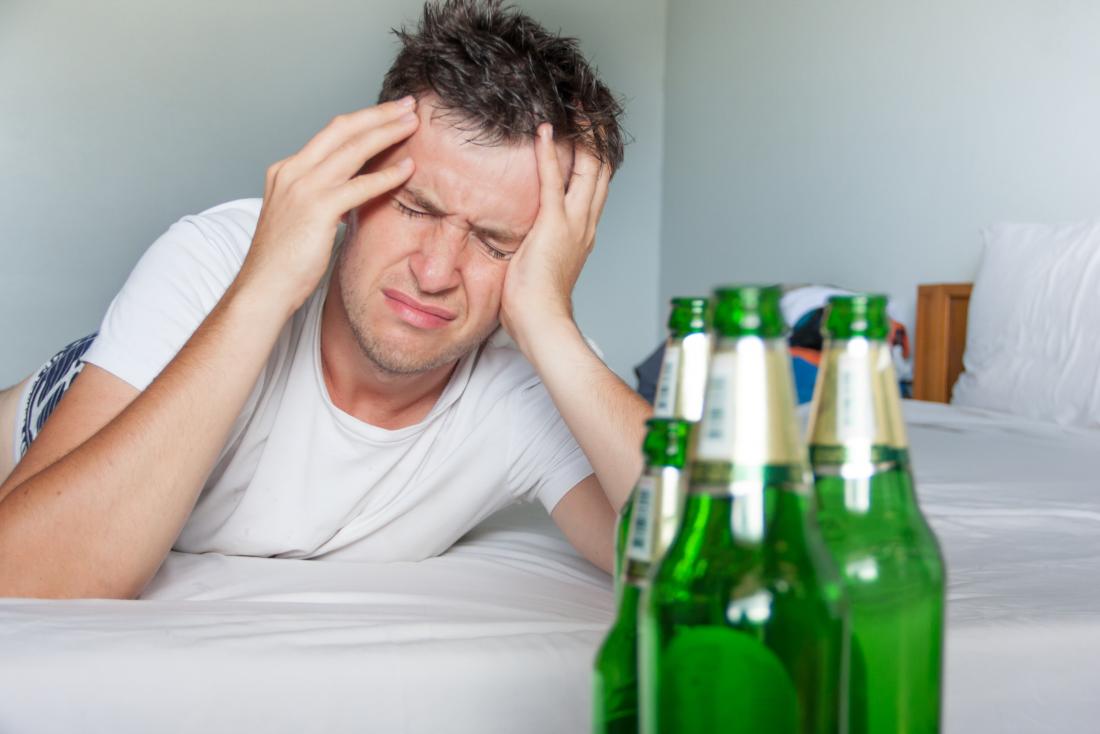A hangover results when toxic, offensive-sounding substance acetaldehyde accumulates in the body. When you overeat, enzymes in your liver convert alcohol into acetaldehyde, which is then converted into acetate.
Although acetaldehyde is reasonably safe, acetate is not; it is responsible for all the awful symptoms that make the morning after, well, awful. The body makes an effort to efficiently turn acetaldehyde into acetate.
However, when you drink frequently and in large amounts, the liver is taxed and finds it difficult to create enough enzymes to break down the poisons. As a result, the chemical that causes nausea and cold sweats persists longer than it should, harming your inside organs.
Symptoms of Hangover
The following are symptoms of Hangover and are most prevalent after drinking has left your system;
- Headache
- Dizziness
- Nausea
- Fatigue
- Thirst
- Reduced appetite
There are many cures for a hangover, but there is little or no evidence to support them. Nevertheless, a few approaches do have possibilities. Continue reading to learn how to avoid or treat a hangover before, during, and after drinking.
What to do Before you Drink
Before you start drinking, try the following preventative measures to lessen the effects of a hangover.
Drink Responsibly
The more alcohol you consume, the worse your hangover will be. Due to this, drinking moderately is the greatest method to avoid getting a hangover. Each person has a different threshold for how much alcohol causes a hangover. You may experience a hangover the next day if you consume enough alcohol to become inebriated. However, 20 to 25 percent of drinkers are “hangover resistant” and do not feel symptoms.
The use of Supplements
Inflammation aids in infection defense and tissue repair in your body. There is evidence that indicates low-grade inflammation is the root cause of many hangover symptoms.
Acetaminophen (Tylenol) should not be used to lessen the effects of a hangover. Your liver may become toxic if you combine alcohol with acetaminophen. Aspirin, ibuprofen, and naproxen are examples of nonsteroidal anti-inflammatory medicines (NSAIDs) that might irritate the stomach lining in addition to helping with hangover symptoms.
Hangovers may also be cured by certain vitamins and therapeutic plants. Further investigation on the efficacy of these treatments was recommended by a 2021 study that found the data supporting this to be of extremely low quality.
According to a short study published in 2019 individuals experienced lower hangovers while consuming foods and beverages high in zinc and B vitamins. Although the research is not of excellent standard, some studies indicate that taking the following substances may greatly lessen hangover symptoms:
- Red ginseng,
- pyritinol,
- tolfenamic acid and
- clove extract.
Drink a lot of Water
As a diuretic, alcohol causes frequent urination. As a result, it might cause dehydration. Although it’s not generally accepted that dehydration is the primary cause of hangovers, it can nevertheless affect symptoms including thirst, headache, lethargy, and dry mouth.
Fortunately, dehydration can be easily prevented by drinking enough water. According to a 2016 study, drinking green tea, honey chrysanthemum tea, or soda water can increase alcohol metabolism and also decrease alcohol-related liver damage. According to the same study, combining alcohol with drinks like fresh orange juice or energy drinks like Red Bull may induce liver damage. As a result, you should avoid doing so.
A good tip is to take at least one large glass of water before going to bed and to drink a glass of water or another non-alcoholic beverage in between drinks.

Abstain from Congener-rich Beverages
Alcoholic beverages mostly include ethanol, but they also contain various levels of congeners. Congeners are also created during the fermentation of sugar by yeasts, which results in the production of ethanol, also known as alcohol in this article. Methanol, isopentanol, and acetone are examples of congeners, which are hazardous substances.
Alcoholic beverages with high congener content appear to make hangovers more common and more severe. Methanol, a common congener, may be highly linked to hangover symptoms, according to studies. Whiskey, cognac, and tequila are alcoholic beverages with a lot of congeners. Congeners are particularly abundant in bourbon whiskey. The amounts of congeners are minimal in beverages that have no color, such as rum, vodka, and gin.
Related:
Alcoholism: The Beautiful Monster
Alcohol Mixed with Energy Drinks: What are the Risks?
A DNA Repair Process Relates Alcohol and Cancer
Ways to get over a Hangover
Even while there isn’t really a “cure” for a hangover, the following activities may help reduce the signs and symptoms after drinking.
Get Adequate Rest
Alcohol might make it difficult to fall asleep. If you stay up too late, it can disturb your entire sleep schedule, affecting both the length and quality of your sleep.
Even though lack of sleep does not directly cause most hangover symptoms, it may be a factor in the weariness and irritability that are frequently felt after a hangover. After binge drinking, getting lots of rest can aid in your body’s recovery. Getting drunk might not be such a good idea if you can’t sleep in and take it easy the next day.

Don’t Drink Alcohol the Next Morning
It seems contradictory to have another drink to cure a hangover. There used to be a common misconception that consuming alcohol the next day would cure hangover, but recent study has demonstrated that this practice is more harmful than helpful.
To avoid delaying the inevitable, it is strongly suggested avoiding having another drink the next morning to heal a hangover. It is not worth risking your health to avoid a few hangovers because drinking alcohol in the morning is usually linked to alcohol dependence.
Have a Healthy Breakfast
Hypoglycemia, a disorder marked by low blood sugar levels, is occasionally linked to hangovers. Because alcohol interferes with the liver’s release of glucose into the blood, it can lower blood sugar levels for hours.

For those with type 1 diabetes who take insulin, this could be risky since the liver might not release enough glucose, which could result in hypoglycemia. Despite not being a prominent factor in hangovers, hypoglycemia may be a factor in the development of symptoms including weakness and headache. After drinking, eating a healthy breakfast or supper late at night may help keep your blood sugar levels stable.
